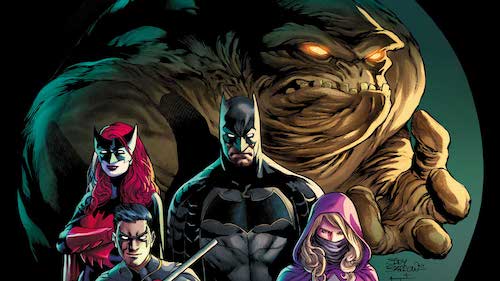Thursday Comics Hangover: Out of left field
Yesterday, I was planning to pick up the first issue of Secret Empire, the new Marvel Comics crossover. (Technically, it was issue #0; the first issue of Secret Empire — as in the issue marked "#1" — is due on May 3rd. If you're already confused, I apologize for what I'm about to put you through.) Every once in a while I like a big superhero crossover if it's handled well, and I enjoyed Nick Spencer's run on Ant-Man a while ago. Seemed worth a shot. But then I saw this tweet by Marvel editor Tom Brevoort:
A quick semi-word of warning for this week's books: the three Opening Salvo issues are meant to be read before Secret Empire #0.
— Tom Brevoort (@TomBrevoort) April 18, 2017
And because of that tweet, I didn't bother to pick up Secret Empire #0. If the first issue — sorry, the zero issue — of a series requires a "semi-word of warning" that three other books should be read beforehand, I can't really be bothered.
Look, I appreciate that superhero comics are a serialized storytelling medium. The minute a story has a conclusive ending, there's no reason for readers to pick up the next installment. But I do expect a story to make sense in and of itself, with a beginning, a middle, and some semblance of an ending. If the beginning of a book requires advance reading, it's not really a beginning.

Or let me use another example from a different publisher. I found the first collected volume of Detective Comics from DC's Rebirth line, Rise of the Batmen, to be a lot of fun. It's basically a Batman superhero team book, in which Batman must assemble a team including the formerly villainous Clayface and three interesting female characters from other Batman-themed books — Batwoman, Spoiler, and the Orphan (who used to be Batgirl) — to fend off an insidious Batman-themed threat.
Rise of the Batmen is mostly a good example of serialized superhero comics done right. The bad guys have a clear motivation, the heroes all have distinct personalities, and it's all terrifically, deliciously silly. Sure, it's a bit too goth — it is a Batman comic, after all — but it's brisk and entertaining and it never takes itself too seriously.
But then comes the ending. One of the characters supposedly dies. But then a page or two later we find out this character — gasp — didn't die after all! Par for the course for superhero comics. Except the character didn't die because they were plucked from the death scene by someone in another dimension or something, a bad guy who had nothing to do with the rest of the book.
Presumably, this plot device is setting up a crossover in some other, future DC Comic further down the line. But if you're reading this book as a book — which is to say you're expecting it to have a beginning, a middle, and an end — you're going to be incredibly disappointed. This isn't a fair ending. It's not a surprise, or a twist. A reader couldn't be expected to know what the hell is going on here without reading a ton of other comics. It's not even a deus ex machina; it's a non sequitur.
I love the fact that superhero comics never end, but I hate the fact that superhero comics are now absurdist echoes of themselves. Comics in the 60s and 70s and 80s used to catch readers up and explain the intricate mythologies behind the characters along the way. I understand that fashions change, and that the exposition-heavy comics from decades ago now read as impossibly clunky.
But surely there must be some way to convey the dense mythology of superhero comics gracefully? One thing comics are great at is broadcasting a lot of information in a relatively small amount of space. Modern superhero comics are all about withholding information, and demanding that the reader invest in dozens of books in order to understand what's going on. This philosophy is not only anti-new-reader; it's anti-comics.